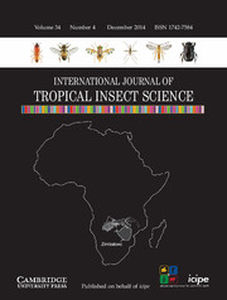No CrossRef data available.
Article contents
Contribution à l'évaluation des potentialités d'Encarsia sp. (Hymenoptera: Aphelinidae) comme agent de lutte biologique contre la mouche blanche du cotonnier, Bemisia tabaci (Homoptera: Aleyrodidae) au Burkina Faso
Published online by Cambridge University Press: 28 February 2007
Abstract
Encarsia sp. is the main solitary endoparasitoid developing on the larvae of the cotton whitefly Bemisia tabaci (Gennadius), in western Burkina Faso. The biological control potential of this parasitoid is currently under investigation. Studies of some population parameters and biological control assays have been undertaken in the laboratory and greenhouse. Encarsia sp. can develop on the four larval stages of B. tabaci obtained in our study conditions, 7 to 15 days after oviposition. The highest rates of parasitism were recorded on the third and fourth larval stages of B. tabaci. The duration of Encarsia development was shorter on the third and fourth than on the first and second instars. The emergence rate of the F1 generation was high (>80%) and seemed not to be related to the different host stages. The sex-ratio favoured females (6:1). Encarsia adults have a relatively short lifespan (<5 days) and males live twice as long as females. In experimental cages, parasitism levels fluctuated over time, and significantly increased with the number of parasitoids introduced. This study constitutes an important advance in assessing the potential of Encarsia sp. for biological control of B. tabaci in cotton crops in Burkina Faso.
- Type
- Research Article
- Information
- International Journal of Tropical Insect Science , Volume 25 , Issue 4 , December 2005 , pp. 266 - 273
- Copyright
- Copyright © ICIPE 2005


